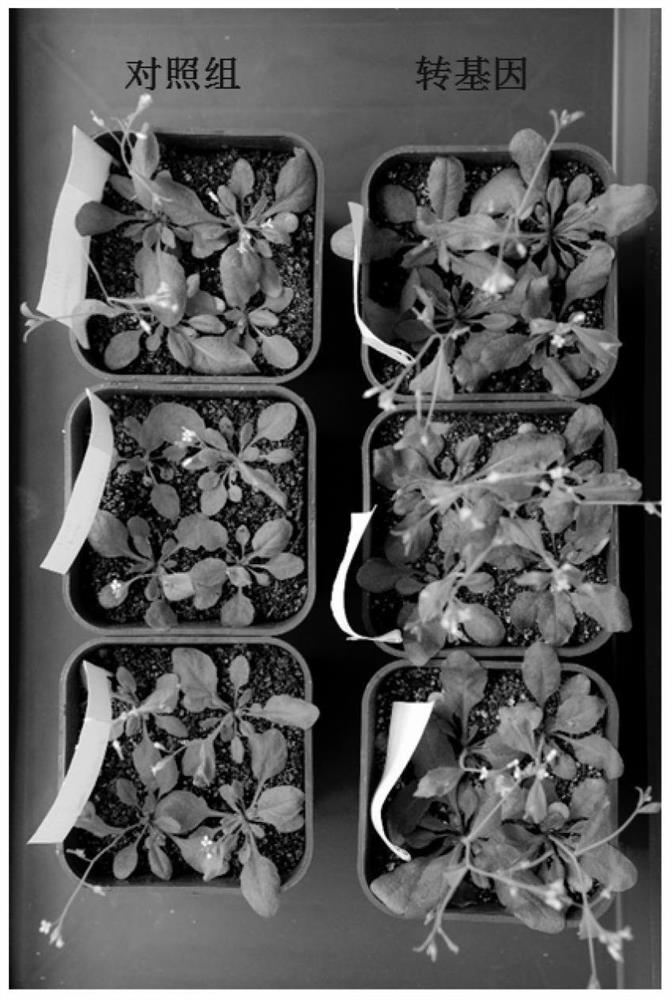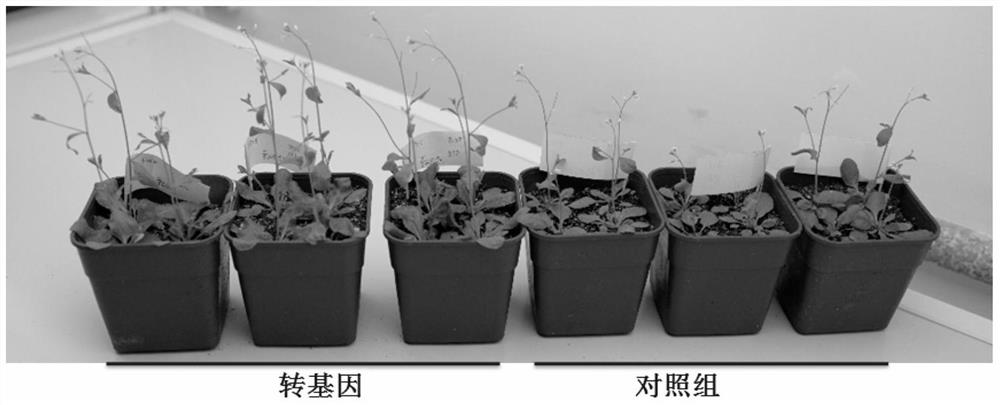A method of promoting plant growth
A technology for plant expression vectors and seeds, applied in the fields of RNA epigenetics and RNA methylation modification
- Summary
- Abstract
- Description
- Claims
- Application Information
AI Technical Summary
Problems solved by technology
Method used
Image
Examples
Embodiment 1
[0040] Example 1 Introduction of hFTO gene into Arabidopsis thaliana (Ecotype Columbia) by transgenic technology
[0041] The transgenic technology that the present invention adopts is the conventional Agrobacterium-mediated method used in the laboratory, and the brief experimental process is as follows:
[0042] 1. Construction of plant expression vector containing human FTO (hFTO) gene
[0043] Using subcloning technology, the hFTO gene was constructed into a plant expression vector (pCAMBIA1307, containing CaMV35S promoter, kanamycin and hygromycin resistance).
[0044] The plant expression vector pCAMBIA1307 is a CaMV35S promoter, resistant to kanamycin and hygromycin, and the hFTO gene is inserted into BamHI and SalI by subcloning technology.
[0045] a) Duplicate the hFTO gene into an insert with BamHI and SalI restriction endonucleases by PCR
[0046] The PCR primers used are respectively the following sequences (as shown in SEQ ID NO: 1-2):
[0047] hFTO-p1 (with ...
Embodiment 2
[0065] Example 2 Screening of Transgenic Arabidopsis and Identification of Homozygous Lines
[0066] 1. Screening of transgenic Arabidopsis T0 generation
[0067] Disinfect the collected T0 generation seeds with sodium hypochlorite and plant them on hygromycin-resistant MS medium plates. After vernalization, culture them under normal conditions. Yellowing can be seen in most seedlings in about 2 weeks. , only a few seedlings did not yellow, and the seedlings that did not yellow may be positive plants.
[0068] 2. Screening of T1 generation of positive plants
[0069] Transplant the above-mentioned few seedlings into flower pots and grow under normal conditions. After the seedlings grow up and pod, the seeds are collected, and the T2 generation is screened, as in the previous step.
[0070] 3. Identification of the T2 generation of homozygous lines
[0071] Transplant the T2 generation seedlings into flower pots and grow under normal conditions. After growing up, collect t...
Embodiment 3
[0072] Example 3 hFTO promotes the growth of Arabidopsis
[0073] Seeds of the T2 generation homozygous lines identified in Example 2 were planted on normal MS medium. After identification and observation, compared with the pCAMBIA1307 empty vector control group, hFTO transgenic Arabidopsis grew faster, had longer root systems, and grew more Larger, please refer to the attached picture for details: figure 1 It is the test result of the 10th day of root growth (the medium plate is placed obliquely during the experiment), and the root length of the seedlings in the transgenic group is 2-3 times that of the control group. figure 2 and image 3 They are photographed from the top and side of the plant, respectively, and are the test results on the 28th day (seeds were transplanted into soil after growing on MS medium for 10 days). From figure 2 It can be clearly seen that the rosette leaves of the transgenic plants are much larger than those of the control group. image 3 ...
PUM
 Login to View More
Login to View More Abstract
Description
Claims
Application Information
 Login to View More
Login to View More - R&D
- Intellectual Property
- Life Sciences
- Materials
- Tech Scout
- Unparalleled Data Quality
- Higher Quality Content
- 60% Fewer Hallucinations
Browse by: Latest US Patents, China's latest patents, Technical Efficacy Thesaurus, Application Domain, Technology Topic, Popular Technical Reports.
© 2025 PatSnap. All rights reserved.Legal|Privacy policy|Modern Slavery Act Transparency Statement|Sitemap|About US| Contact US: help@patsnap.com



